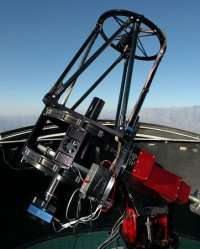RC Optical Systems
RC Optical Systems was a high-end American telescope and optics manufacturer that specialized in Ritchey-Chrétien telescopes with hyperbolic mirrors.[1] RC also made related mounts and systems for the telescopes, with a focus on open and closed carbon fiber trusses for low expansion. The Ritchey-Chrétien uses two mirrors and no refractors, which reduces light loss and its optical characteristics make it popular for astrophotography. RC Optical Systems was started 1998 and was located in Flagstaff, Arizona.[2] Telescopes and systems were sold commercially to individuals, institutions, and governments.[3] The smallest RCOS telescope, the 12.5 inch F/9 Ritchey-Chrétien had a base price of just over twenty thousand US dollars in 2009, with large and/or custom models costing considerably more.




RC Optical Systems and Star Instruments won a lawsuit in 2008 against Meade Instruments over Meade's description of RCX400 and LX200R telescopes and the Ritchey-Chrétien classification.[4]
RC Optical Systems produced the Lulin Observatory 0.41-m (16-inch) f/8.8 in Taiwan[5] Six .61 RCOS are being used in the PROMPT telescope (Panchromatic Robotic Optical Monitoring and Polarimetry Telescopes), which is being built by the University of North Carolina at Chapel Hill at Cerro Tololo Inter-American Observatory (CTIO) in Chile.
In 2007 a RC OS telescope was installed at the Robinson Observatory of the University of Central Florida, USA.[6] The telescope produced by RCOS has a 20inch diameter aperture.[7] The telescope replaced the 26-inch Tinsley Telescope which was in the dome previously.[8]
Liberty University installed a 20-inch RCOS telescope in 2012.[9] The telescope is intended for high-quality research, and they intended to eqip the telescope with a CCD camera for Astrophotography.[10]
A 50 cm aperture RCOS telescope formed the basis of the TacSat-2 observation system, an experimental satellite launched in 2006. RCOS shut down operations in late 2013 and no longer provides support for any of their telescopes or accessories.[11]
RCOC telescopes have also been known to be used by amateur astronomers.[12] In one case an amateur astronomer, also a college professor, reported that he had a 10" Ritchey-Chretien telescope from RC Optical Systems among his telescopes along with two refractors.[13]
Major designs offered by 2009, over a decade after its founding included [14]
- Telescopes for astronomy
- 12.5 inch F/9 Truss Ritchey-Chrétien, 12.5 inch F/9 Ritchey-Chrétien
- 14.5 inch Truss Ritchey-Chrétien
- 16 inch F/8.4 Ritchey-Chrétien, 16 inch Truss F/8.4 Ritchey-Chrétien
- 20 inch F/8.1 Ritchey-Chrétien, 20 inch Truss F/8.1 Ritchey-Chrétien
- 24 inch f/8 Truss Ritchey-Chrétien [15]
- 32 inch Truss (81 cm) f/7 Ritchey-Chrétien [16]
- Telescopes for ruggedized and military use
- 12.5 inch f/9 Military Ritchey-Chrétien
- 16 inch f.8.4 Military Ritchey-Chrétien
- 20 inch f/8.1 Military Ritchey-Chrétien
- 24 inch f/8 Military Ritchey-Chrétien
- 32 inch f/7 Military Ritchey-Chrétien
- 34 inch f/8 Military Ritchey-Chrétien
References
- Star Instruments and RC Optical Systems Prevail over Meade Instruments
- http://www.manta.com/coms2/dnbcompany_jg380
- http://www.rcopticalsystems.com/observ.html
- Star Instruments and RC Optical Systems Prevail over Meade Instruments
- http://luss.y234.cn/overview.htm
- "UCF sure has changed over the past 48 years". Central Florida Future. Retrieved 2017-01-11.
- [http://www.prweb.com/releases/2012/8/prweb9847415.htm
- "New Observatory to Open at Liberty University in Spring 2013". PRWeb. Retrieved 2017-01-11.
- Astronautix - Tacsat2
- V, Robert; erbei; March 27, Princeton University |; ET, 2015 03:28am. "Take Stunning Moon Shots, From Your Driveway (Gallery)". Space.com. Retrieved 2019-01-01.
- V, Robert; erbei; March 27, Princeton University |; ET, 2015 03:28am. "Take Stunning Moon Shots, From Your Driveway (Gallery)". Space.com. Retrieved 2019-01-01.
- http://www.rcopticalsystems.com/prodline.html
- http://www.lightbuckets.com/news/5/rc-optical-systems-24-ritchey-chretien-review/
- "Robtics | RC Optical Systems 32 inch F/8 Ritchey-Chretien Carbon Truss". www.robtics.nl. Retrieved 2017-01-11.